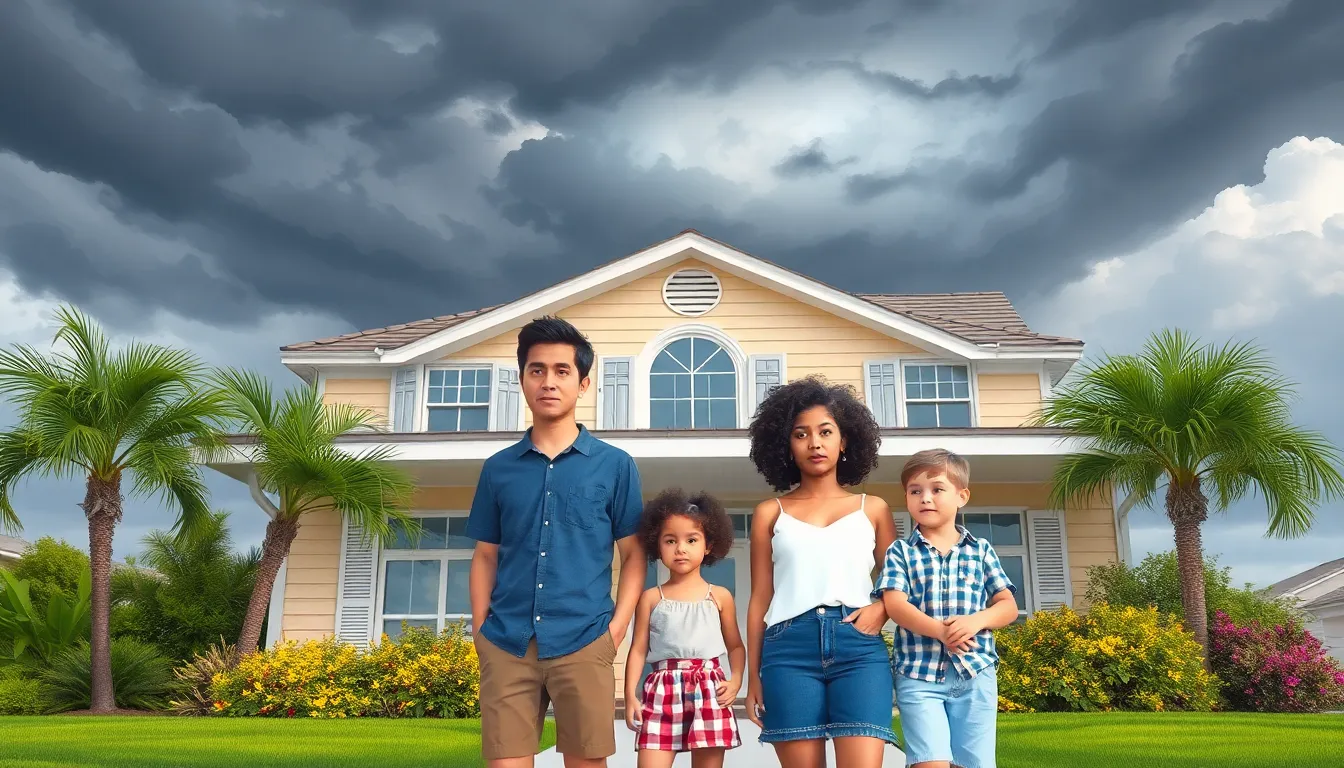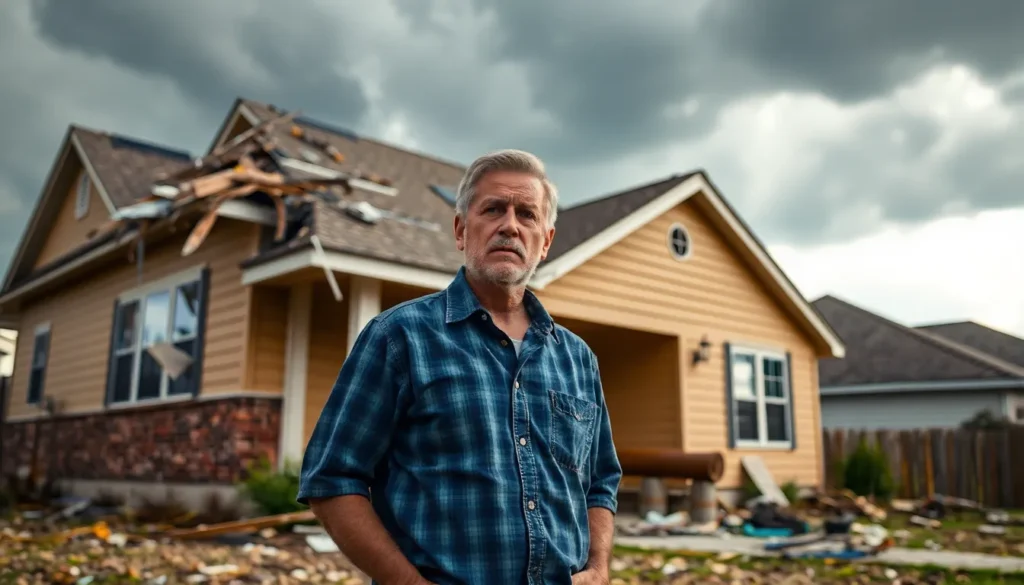When hurricane season rolls around, many homeowners find themselves asking a crucial question: does home insurance cover hurricane damage? It’s like asking if your favorite pizza place delivers during a storm—essential information that can save you from a soggy situation. With winds howling and rain pouring, the last thing anyone wants to worry about is whether their insurance will come to the rescue when Mother Nature throws a tantrum.
Understanding the ins and outs of home insurance coverage can feel like trying to decode hieroglyphics. Some policies might cover wind damage while others turn a blind eye to flooding. As the storm clouds gather, knowing what’s at stake can mean the difference between a safe haven and a waterlogged disaster zone. So grab your umbrella and let’s dive into the world of home insurance to uncover what’s really covered when the winds start howling.
Table of Contents
ToggleUnderstanding Home Insurance
Home insurance provides financial protection against various hazards that can lead to damage. Coverage typically includes the structure of the home, personal belongings, and liability for accidents. Homeowners must familiarize themselves with their specific policies to understand what is included.
Standard home insurance policies often cover wind damage, which is crucial during hurricanes. However, flood damage might not fall under standard coverage. Many homeowners face gaps in coverage that leave them vulnerable to significant losses.
Additional endorsements or separate flood insurance may offer protection against flooding caused by heavy rains and storm surges. According to the National Flood Insurance Program, almost 20 percent of flood claims come from low-risk areas. This statistic highlights the importance of reviewing flood risks even for homes not in designated flood zones.
Most insurance policies outline exclusions and limitations, so homeowners should carefully read their contracts. Negotiating terms or adjusting policies based on geographic location can enhance coverage. It’s beneficial to consult with insurance agents or experts to clarify any uncertainties.
Reviewing and understanding policy specifics enables homeowners to prepare adequately for potential storm damages. Keeping records of property values and recent investments is essential for ensuring adequate coverage. Being proactive about insurance choices safeguards investments against unpredictable weather events.
Types of Home Insurance Policies

Homeowners encounter various types of insurance policies that determine coverage for hurricane damage. Understanding these options is essential for adequate protection during severe weather events.
Standard Policies
Standard home insurance policies typically cover wind damage. This includes the structural elements of a home and personal belongings, providing protection against perils like hurricanes. However, these policies often exclude flooding, leaving homeowners exposed during major storms. Many homeowners in coastal areas may assume wind and hurricane damage are included in their coverage, but checking policy details for exclusions is crucial. If flooding occurs, alternative options such as separate flood insurance become necessary to ensure comprehensive protection.
Specialized Policies
Specialized home insurance policies cater to specific risks associated with hurricanes. These might include windstorm insurance that focuses on damage from high winds. Additionally, other coastal regions may offer specific hurricane coverage, which complements standard policies. Homeowners can also consider policies that include additional living expenses during evacuation. Since needs vary by geographic location, homeowners must assess available options and consult insurance agents for tailored coverage. Investing in specialized coverage can safeguard assets against the unique threats posed by hurricanes.
What Hurricane Damage Includes
Hurricane damage typically encompasses various types of destruction, primarily focusing on wind and flood-related incidents.
Wind Damage
Wind damage includes destruction caused by strong hurricane winds. Roofs may sustain significant damage, including missing shingles or entire sections being ripped off. Windows often break from flying debris, allowing rain and additional wind indoors. Structural components, such as walls and doors, may also experience stress or collapse under extreme wind pressure. Policies often cover this type of damage under standard home insurance. However, it’s crucial for homeowners to check their specific policy to ensure adequate financial protection for wind damage.
Flood Damage
Flood damage arises when heavy rains or storm surges overwhelm drainage systems. This type of destruction significantly affects homes, leading to costly repairs and potential loss of personal belongings. Standard home insurance policies typically exclude flood damage, leaving homeowners vulnerable in hurricane-prone areas. Additional flood insurance or specialized policies often provide necessary coverage for this risk. Homeowners should evaluate their flood risk based on geographic location and consider investing in policies that protect against flood damage to avoid substantial financial losses.
Does Home Insurance Cover Hurricane Damage?
Home insurance coverage for hurricane damage varies based on policy specifics and location. Understanding the key components helps homeowners prepare effectively for storm-related damages.
Typical Coverage Policies
Standard home insurance policies generally cover wind damage significantly. High winds can cause roof damage, uproot trees, and break windows, and these incidents typically fall within coverage. Homeowners in hurricane-prone areas should check their policies for this inclusion. A majority of policies also protect personal belongings, providing compensation for damaged items. Policies may include additional structures, like fences and sheds, under certain conditions. Those at higher risk may consider specialized coverage to enhance their protection further.
Exclusions to Watch For
Not all damage is covered under standard home insurance policies. Flood-related damages often fall outside the scope of basic coverage. Heavy rains or storm surges can lead to significant flooding, but homeowners usually face exclusion in such cases. It’s critical to evaluate the geographic risk of flooding when selecting a policy. Homeowners might find it necessary to obtain separate flood insurance for complete protection. Some policies could also include deductibles based on type of storm damage, which may affect claims. Regularly reviewing policy exclusions aids homeowners in understanding their coverage limits and preparing for potential losses.
Steps to Take After Hurricane Damage
Documenting damage is critical immediately after a hurricane. Homeowners should take clear photos and videos of affected areas, capturing both structural damage and damaged personal belongings. This evidence will support insurance claims.
Next, ensure safety. Before entering the home, assess the surroundings for hazards like fallen power lines or unstable structures. If it’s unsafe, seek professional assistance or wait for local officials to assess the situation.
Contact your insurance company soon after assessing the damage. Reporting the damage promptly can help expedite the claims process. Many insurers provide 24-hour hotlines for this purpose.
A homeowner may also want to create a detailed inventory of damaged items. List these items with descriptions, purchase dates, and estimates of their value. This inventory supports financial claims and allows for a clearer understanding of losses.
Consider making temporary repairs to prevent further damage. Cover broken windows with tarps and secure openings to minimize exposure to the elements. Keep receipts for any expenses incurred during these repairs, as they may be reimbursable.
Evaluate if it’s necessary to consult a professional contractor. Hiring a contractor can ensure repairs align with safety codes and regulations. This expertise can also streamline the recovery process.
Monitoring communications from local authorities is essential. Updates regarding recovery efforts and available resources can assist homeowners in accessing needed support. Many communities will establish local aid centers for recovery assistance.
Finally, remember to review the home insurance policy once recovery efforts begin. Understanding what’s covered and what isn’t will inform future decisions and help ensure adequate coverage for any potential future storms.
Navigating home insurance during hurricane season can be daunting. Understanding the nuances of coverage is essential for homeowners to protect their investments. While wind damage is often covered, flooding typically requires additional policies.
By reviewing and adjusting their insurance plans, homeowners can better prepare for the unexpected. It’s crucial to consult with insurance professionals to ensure comprehensive protection tailored to individual needs and geographic risks. Being proactive today can make all the difference when disaster strikes.






